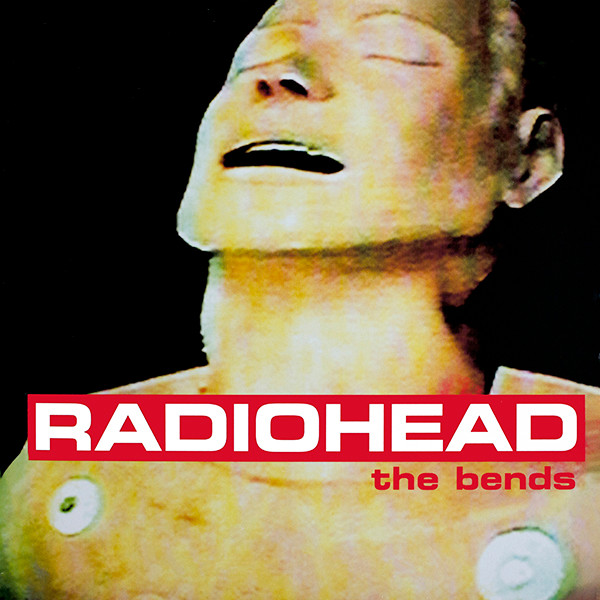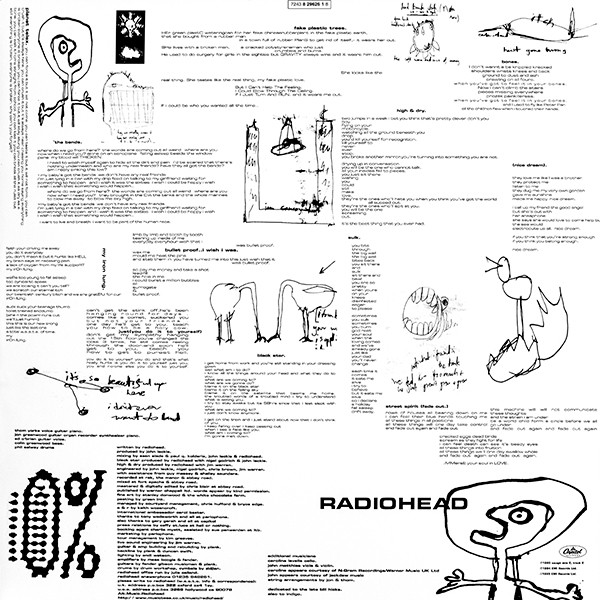
By the mid-1990s, the members of Radiohead were exhausted. “Creep”, the brooding anthem from the band’s 1993 debut Pablo Honey, had become a surprise mega-hit, thanks to its music-box chorus and tidal noise. Yet the song had also turned into an albatross for Thom Yorke and his bandmates. They were sick of playing it live, and worried it would be their legacy. Could they write something as good as “Creep”—or would they be forever consigned to the junk bin of one-hit wonders?
The only way to find out was to head back into the studio. The stop-and-start sessions for the group’s sophomore album stretched across much of 1994, as Radiohead searched for songs and sounds that didn’t forever put them in a pigeonhole—but that also didn’t immediately alienate every audience member they’d earned.
The resulting album, 1995’s The Bends, kicks off with “Planet Telex”—a song written late in the process, but one that would demonstrate that Radiohead wasn’t aiming for another “Creep”. With its delayed pianos and wafting guitar chords offering new textures, and Yorke’s vocals offering a sense of frustrated urgency, “Planet Telex” announces the beginning of Radiohead’s first masterpiece.
The rest of The Bends is just as invigorating. Though these are recognisable guitar-rock songs—ones that are not altogether removed from 1995’s lingering grunge haze—Radiohead introduces a half-dozen new musical elements: There’s Yorke’s yearning falsetto during the gorgeous and tragic “Fake Plastic Trees”, inspired by a Jeff Buckley gig. The warped drums and strums of “High and Dry”. The accretive repetition of “Street Spirit (Fade Out)”. Even on first listen, it was clear Radiohead’s ambition, palette and experience had moved far beyond that of Pablo Honey.
The Bends also announced Radiohead as savvy critics of modernity, with Yorke’s lyrics analysing our increasing distrust of technology—and its impact on our relationships—way better than his peers. Where “Fake Plastic Trees” decries our everything-all-the-time approach to consumerism, “Black Star” mourns our collective struggles with mental illnesses—and the way society can easily brush them aside. And while The Bends failed to deliver a “Creep”-sized hit, the album did set up Radiohead as one of music’s great iconoclasts—and set the band members on the path to art-rock infamy.
Tracklisting
| Position | Title |
|---|---|
| A1 | Planet Telex |
| A2 | The Bends |
| A3 | High And Dry |
| A4 | Fake Plastic Trees |
| A5 | Bones |
| A6 | (Nice Dream) |
| B1 | Just |
| B2 | My Iron Lung |
| B3 | Bullet Proof..I Wish I Was |
| B4 | Black Star |
| B5 | Sulk |
| B6 | Street Spirit (Fade Out) |
Apple Music
Release Images
Release Information
| Key | Value |
|---|---|
| Wikipedia URL | https://en.wikipedia.org/wiki/The_Bends_(album) |
| Format | 1× Vinyl (180 Gram) LP, Album, Limited Edition, Reissue |
| Label | Capitol Records |
| Catalog Number | 7243 8 29626 1 8 |
| Notes | 2008 US reissue of original 1995 UK vinyl release (first US vinyl issue). Hype sticker on shrinkwrap on some copies: “From The Capitol Vaults 180 Gram Vinyl Audiophile Quality Faithfully Restored Limited Edition” Includes a cardstock inner sleeve with lyrics, credits, artwork, and graphics / photo collage. First catalog number (7243 8 29626 1 8) on jacket, inner sleeve. Second catalog number (8296261) on labels. Track B3 title on labels: Bullet Proof…I Wish I Was Runouts are mostly etched, mastering stamped. Recorded at RAK, The Manor & Abbey Road. Mixed at Fort Apache & Abbey Road. Mastered & digitally edited at Abbey Road. Dedicated to the late Bill Hicks. Also to Indigo. ℗ 1995 except side 2, track 2 ℗ 1994 EMI Records Ltd. © 1995 EMI Records Ltd. |
| Discogs URL | Radiohead - The Bends |







